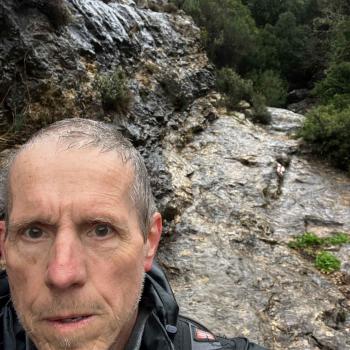Editor's Note: This is the second in a four-part series on wilderness spirituality called Going Cimarron.
You better get converted in the desert. Jesus did.
I'm just going to say it: Jesus needed a conversion experience. He found it in the desert. He was an evolving and struggling being who went to the wilderness to undergo radical life-change.
This statement would have been heretical to the religion of my childhood. I grew up seeing Jesus as pre-made Messiah, born as God-in-flesh. Sure, Christendom talked about Jesus being "fully human and fully God," but let's get serious: any being who is fully God is not fully human, at least not like I'm human.
Jesus...was led by the Spirit in the wilderness. (Lk. 4:1)
The ways the Bible presents Jesus' testing in the wilderness leaves me wanting more. What really happened out there? No one was around to record the actual events, but according to the Gospel writers, none of the temptations seem to have perturbed Jesus much. Temptation, schmemptation. He refuses each enticement with a quick, wise response. It's as if our perfect Son of God overcomes without any effort, learns nothing from the testing, says hasta la vista to the evil one trying to corrupt him, and then clocks back into society.
But if temptations weren't a big deal, why go to the wilderness? Why would it matter?
Try this on: the temptations had to be a big deal. Jesus went because he needed to change, to be converted. Parts of him needed to die so God could fully enter.
It's hard to deny that Jesus developed over time. It's there for all to see: "Jesus grew in wisdom and stature and in favor with God and humankind" (Lk. 2:52). Despite Christendom's tendency to call Jesus sinless and perfect, the Scriptures show he didn't have such an exalted opinion of himself. Just like us, Jesus knows he has a shadow side. "Why do you call me good?" he asks in all three synoptic Gospels. "Only God is good."
Even after his metanoia in the desert, doing the will of God did not always come easily to Jesus. The most dramatic instance of this: Jesus' agonizing, sleepless night in Gethsemane near the end of his life. "Take this bitter cup from me!" he rages in the darkness. Just like us, at times he resists God's call to selflessness. "Haven't I given enough?" I imagine he roars at the sky, ranting and crying and clawing at the earth. His prayer is so intense the Scriptures say he sweated blood, turning the very stones red.
These are not the actions and words of a pre-packaged Messiah. In truth, I don't want them to be. His struggles matter. His life is so much more meaningful when I think of Jesus as a developing being. He screamed. He resisted. He evolved. Just like we do. He was called, time and time again, to become a bigger vessel for God. Just as we are.
The wilderness gave Jesus strength. It is not simply a place of negation or temptation. It is also a place of preparation and perception, absent of human power structures and controls, a wild place where supernatural forces move unfettered—a place that can empower, depending upon how the experience is handled. Our wildernesses and deserts are not our endings. It is the Spirit of God who leads us about in them. They are our opportunities. (from the Renovare Spiritual Formation Bible. Contributors: Richard Foster, Dallas Willard, Walter Brueggemann, and Eugene Peterson [1989])
So what did his wilderness experience do for Jesus?
As Jim Douglass asks in the phenomenal little book Lightning East to West, what did Jesus find in the desert?
I'm not sure, but I can make some guesses.
Richard Rohr asserts that if you are going to say "thy kingdom come," in the next breath you need to say "my kingdom go." I'm guessing Jesus did exactly that: in the wilderness he experienced radical emptying—kenosis—prior to being filled with an incredibly deep assurance of identity, purpose, abundance, and radical grace. Could it be that Jesus became his divine potential because of his testing in the desert? Could it be that—in the midst of his desert sojourn—Jesus experienced such profoundly deep union with God that he became one with God?
My gut tells me yes, and the Scriptures resonate. It was only after his baptism in the desert by John that Jesus understood himself as an utterly beloved child of God. It was only after the wilderness that Jesus dared to name the Creator "Abba"—an intimate word we would translate as "Daddy," his one and only provider, source, guide, and caretaker. Only after the wilderness did he call the universe abundant. Only after the wilderness did Jesus begin his public ministry of personal and social transformation, daring people to repent, to turn their lives from Empire and turn them over to an all-embracing, extravagant God, just as he had.




